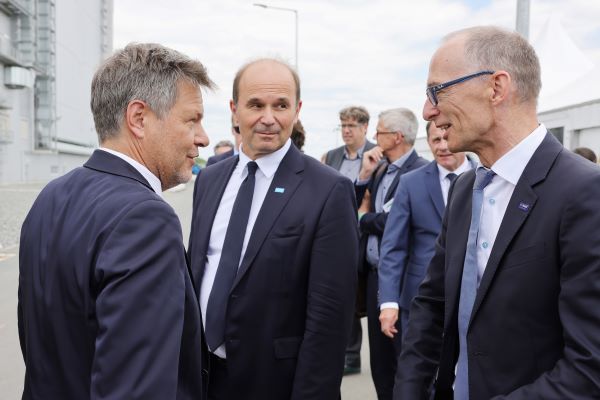Kick off for world-class battery recycling plant to produce black mass in Europe in the most sustainable way

l-R: Robert Habeck, Federal Minister for Economic Affairs and Climate Action, Dr. Martin Brudermüller, Chairman of the Board of Executive Directors of BASF SE, Dr. Peter Schuhmacher, President Battery Materials and Recycling and Catalysts division. PIX: BASF
BASF today celebrated the opening of Europe’s first co-located center of battery material production and battery recycling in Schwarzheide, Germany.
The inauguration of a state-of-the-art production facility for high-performance cathode active materials and the unveiling ceremony for a battery recycling plant for the production of black mass represent important steps toward closing the loop for the European battery value chain – from the collection of used batteries and the recovery of mineral raw materials to their use in the production of new battery materials.
“Despite all challenges we are currently facing in Europe, today is a reason for all of us to be optimistic. The state-of the art cathode active materials plant and the recycling plant for black mass production underline that we at BASF believe in the future of the chemical industry in Europe and in Germany and invest in innovative products and services for our customers in our home market,” said Dr. Martin Brudermüller, Chairman of the Board of Executive Directors of BASF SE. “With our two investments we significantly contribute to the reduction of the CO2 footprint of batteries and close the loop for sustainable mobility.”
European Commission Vice President Maroš Šefčovič emphasized the importance of creating a competitive and sustainable battery cell manufacturing value chain in Europe. “The EU battery market is rapidly growing. Demand for batteries is expected to continue to increase drastically in the coming years for both mobility and storage, and our competitors are also pursuing this market. In this context, the European Commission is committed to keep building a solid battery ecosystem in Europe. This is why we have created the European Battery Alliance, which has helped to generate more than €180 billion in private investments so far. The BASF plant benefited from this work. With its focus on advanced cathode active material and on recycling, it demonstrates that we can boost the EU’s competitiveness and reduce its dependencies in a strategic sector, and accelerate the green transition.”
The new plant is not only the first production facility for high-performance cathode active materials in Germany, but also the first fully automated large-scale cathode active materials production facility in Europe. The plant is fully sold out for the next years and will supply products tailored to the specific needs of cell manufacturers and automotive OEMs in Europe. The carbon footprint of BASF’s innovative cathode active materials is significantly lower than the industry benchmark thanks to BASF’s proprietary efficient production technologies, which include minimized energy consumption and a high proportion of renewable energy. In order to meet growing customer demand for the European electric vehicle market, BASF is already preparing additional investments for cathode active materials in Europe and is in advanced negotiations with customers. This underlines BASF’s commitment to establishing a robust, localized battery value chain in Europe.
Dr. Robert Habeck, Federal Minister for Economic Affairs and Climate Action said: “With the combination of a state-of-the-art CAM manufacturing and a recycling facility, Germany gains a key piece of the puzzle for its growing battery ecosystem. BASF's project increases our sovereignty along the value chain, promotes the circular economy and thus strengthens economic security. The decision in favour of Schwarzheide underscores the attractiveness of the site – its history and chemical knowhow as well as its abundance of renewable energy in the vicinity. The project also highlights the ongoing transformation: Here, where coal was long liquefied into gasoline, the active material for EV batteries will be produced from now on. We are happy to support this transformation with IPCEI funding.”
BASF already offers cathode active materials based on recycled metals as a closed-loop solution in Asia and North America to conserve resources and further reduce their CO2 footprint. With the investments in Schwarzheide, BASF is now directly supporting the European market and at the same time enabling faster growth for its global business. End-of-life batteries and waste from battery production are mechanically processed in the new plant for black mass production. “Black mass” contains key metals used to make cathode active materials: lithium, nickel, cobalt and manganese. In a second step, these valuable metals can be chemically recovered in the most sustainable way and used to produce new cathode active materials. Construction of a black mass production facility has already begun, and production is expected to start in 2024.
“By establishing our first European co-located center for battery materials and recycling, we want to strengthen the battery value chain in Europe,” said Dr. Peter Schuhmacher, who is responsible for BASF’s Battery Materials and Recycling business and President of the Catalysts division. “We will continue to close the loop and invest in our production and recycling capacities globally to meet the demand of our customers for high-performance cathode active materials with a low CO2 footprint.”
Subscribe to our newsletter & stay updated.